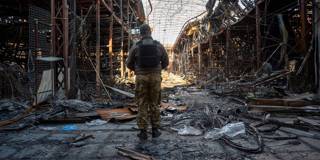Unless Western governments confiscate all frozen Russian assets and give them to Ukraine, the Ukrainians will lose the war, and that outcome will be far more more costly for the West. G7 leaders should stop finding excuses, stop being dishonest with their own taxpayers, and just get it done.
LONDON – If Ukraine is going to defeat Russia and rebuild itself after the war, it will need huge sums of money, probably exceeding what Western electorates and politicians are willing or able to provide. The good news is that there is a massive pot of non-Western money already available: the $300 billion of frozen Russian sovereign assets held in Western jurisdictions. The bad news, however, is that Western countries have been unable to agree on a shared plan of action to use these assets.

LONDON – If Ukraine is going to defeat Russia and rebuild itself after the war, it will need huge sums of money, probably exceeding what Western electorates and politicians are willing or able to provide. The good news is that there is a massive pot of non-Western money already available: the $300 billion of frozen Russian sovereign assets held in Western jurisdictions. The bad news, however, is that Western countries have been unable to agree on a shared plan of action to use these assets.